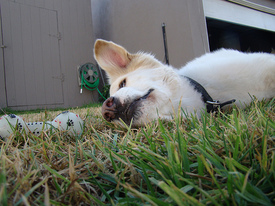Pig ears sold at Target stores recalled because of potiential health risk

This pooch is tired out from chewing on a rubber chew toy designed for dogs. They are a relatively safe choice because they do not inherently contain salmonella. With any chew toy, dogs should be supervised during play due to the choking hazard.
flickr photo courtesy of vmiramontes
Another purveyor of the treats is at the center of another voluntary recall due to a possible health risk to your pets.
According to the Food and Drug Administration, Kasel Associated Industries of Denver is voluntarily recalling its Boots and Barkley Roasted American Pig Ears and Boots and Barkley Variety Pack Dog Treats products because it may be contaminated with Salmonella.
The pig ears were sold in a clear plastic bag containing 12 pig ears and are marked with UPC bar code 647263899158.
The Variety Pack product in a clear plastic bag (32oz) and is marked with UPC bar code 490830400086.
Both products bear the lot number BESTBY 13SEP2014DEN because it tested positive for the Salmonella bacteria after being analyzed by the Colorado Department Of Agriculture.
The recalled products were sold in Target stores in August 2012.
At this time, no illnesses have been reported.
This isn't the first recall by the company. A few weeks ago, Kasel Industries recalled specific lots of their bully sticks.
Cathy Theisen, DVM, a mobile veterinary doctor serving the Ann Arbor area, expands on why salmonella is a concern.
"It really depends on how much previous exposure to that strain of salmonella the dog has. Your average active dog has wolfed down goose poop, horse manure, drank and swum in infected ponds and eaten half-rotten road kill — all of which provided a likely dose of salmonella bacterium. Those dogs are often effectively immune, having been exposed to nonlethal doses over a lifetime," she said.
While this gives some level of immunity, it's important to remember that there are different strains of salmonella, and your pet has likely not been exposed to all of them. Keeping that in mind, it's important to first of all keep on top of reported pet food recalls and not allow your pet to consume things that are infected by the bacteria, regardless of the source.
"That said," Theisen continues, "I would never knowingly feed a dog a diet infected with salmonella. This may be high doses of the bacteria and also a strain of bacteria that the dog hasn't encountered in its local environment. If the dog is susceptible, the consequences can be quite severe, and even fatal, especially for dogs who have no previous exposure. If the dog is showing symptoms, it should be treated immediately."
Pet food and treat recalls are updated here on AnnArbor.com's pet section as they are released, and as it turns out, salmonella is the most common reason for recalls and both pets and humans are susceptible. It can affect raw and kibble-based diets alike — as well as treats — and for that reason, the precautions with each are the same.
The number one day-to-day precaution: Proper hand washing techniques after handling the products.
There are more than 2,000 strains of salmonella. Very young and very old pets are most susceptible to the bacteria and suffer the effects most profoundly. The most common symptoms associated with salmonella are vomiting, diarrhea and fever. Companion animals presenting with symptoms are treated with IV fluids and antibiotics.
Consumers who purchased the recalled pig ears should return them to the place of purchase for a full refund. Consumers with questions may contact Kasel Associated Industries at 800-218-4417 Monday through Friday from 7 a.m. to 5 p.m. (MDT).
Past pet product recall information is available here.
Lorrie Shaw leads the pets section for AnnArbor.com and is owner of Professional Pet Sitting. Contact her by e-mail and follow her pet adventures on Twitter.


Comments
Ann English
Wed, Oct 17, 2012 : 11:17 p.m.
You make it sound like salmonella bacteria is more dangerous for dogs than the parasites they get from half-rotten roadkill. You may be right. The tapeworm my last dog got from a dead pheasant made her act occasionally like she was nauseated, even after eating the bland dog food from the vet, but that was the extent of her symptoms.
Lorrie Shaw
Wed, Oct 17, 2012 : 11:35 p.m.
Ann: Salmonella can be quite serious for some pets, sadly, as illustrated in the piece. It really depends on the level of previous exposure, as well as the age of the pet and overall health. Any pathogen, no matter the source or type can be challenging to a pets system. As you've already experienced, it's always a good idea to keep an eye on a pet's stool, appetite, etc. to be vigilant of infections of this type. As always, thanks for reading and taking the time to comment. It's much appreciated!